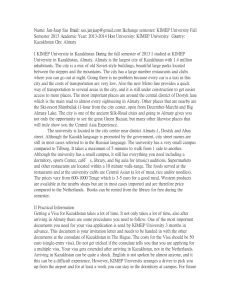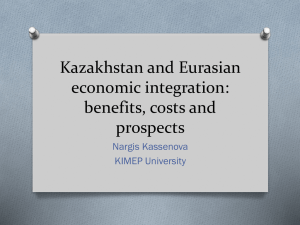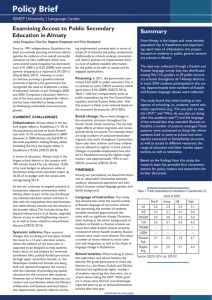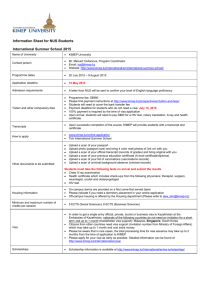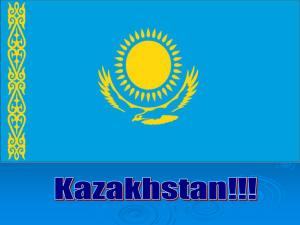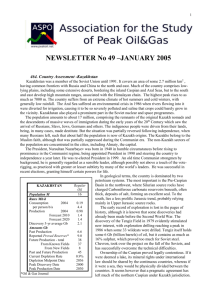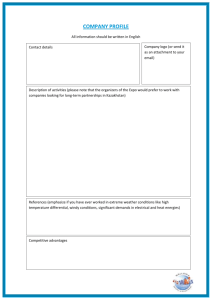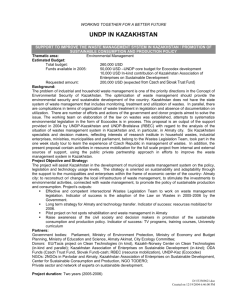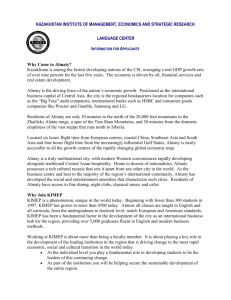Anna Marisa Schön - Tilburg University
advertisement
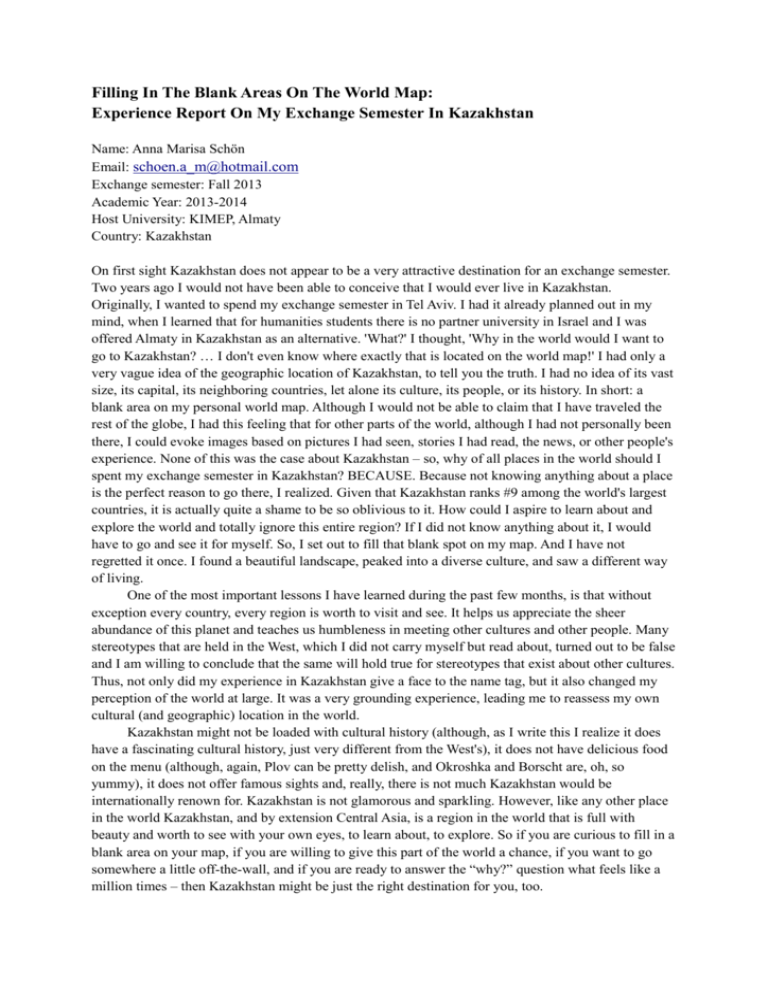
Filling In The Blank Areas On The World Map: Experience Report On My Exchange Semester In Kazakhstan Name: Anna Marisa Schön Email: schoen.a_m@hotmail.com Exchange semester: Fall 2013 Academic Year: 2013-2014 Host University: KIMEP, Almaty Country: Kazakhstan On first sight Kazakhstan does not appear to be a very attractive destination for an exchange semester. Two years ago I would not have been able to conceive that I would ever live in Kazakhstan. Originally, I wanted to spend my exchange semester in Tel Aviv. I had it already planned out in my mind, when I learned that for humanities students there is no partner university in Israel and I was offered Almaty in Kazakhstan as an alternative. 'What?' I thought, 'Why in the world would I want to go to Kazakhstan? … I don't even know where exactly that is located on the world map!' I had only a very vague idea of the geographic location of Kazakhstan, to tell you the truth. I had no idea of its vast size, its capital, its neighboring countries, let alone its culture, its people, or its history. In short: a blank area on my personal world map. Although I would not be able to claim that I have traveled the rest of the globe, I had this feeling that for other parts of the world, although I had not personally been there, I could evoke images based on pictures I had seen, stories I had read, the news, or other people's experience. None of this was the case about Kazakhstan – so, why of all places in the world should I spent my exchange semester in Kazakhstan? BECAUSE. Because not knowing anything about a place is the perfect reason to go there, I realized. Given that Kazakhstan ranks #9 among the world's largest countries, it is actually quite a shame to be so oblivious to it. How could I aspire to learn about and explore the world and totally ignore this entire region? If I did not know anything about it, I would have to go and see it for myself. So, I set out to fill that blank spot on my map. And I have not regretted it once. I found a beautiful landscape, peaked into a diverse culture, and saw a different way of living. One of the most important lessons I have learned during the past few months, is that without exception every country, every region is worth to visit and see. It helps us appreciate the sheer abundance of this planet and teaches us humbleness in meeting other cultures and other people. Many stereotypes that are held in the West, which I did not carry myself but read about, turned out to be false and I am willing to conclude that the same will hold true for stereotypes that exist about other cultures. Thus, not only did my experience in Kazakhstan give a face to the name tag, but it also changed my perception of the world at large. It was a very grounding experience, leading me to reassess my own cultural (and geographic) location in the world. Kazakhstan might not be loaded with cultural history (although, as I write this I realize it does have a fascinating cultural history, just very different from the West's), it does not have delicious food on the menu (although, again, Plov can be pretty delish, and Okroshka and Borscht are, oh, so yummy), it does not offer famous sights and, really, there is not much Kazakhstan would be internationally renown for. Kazakhstan is not glamorous and sparkling. However, like any other place in the world Kazakhstan, and by extension Central Asia, is a region in the world that is full with beauty and worth to see with your own eyes, to learn about, to explore. So if you are curious to fill in a blank area on your map, if you are willing to give this part of the world a chance, if you want to go somewhere a little off-the-wall, and if you are ready to answer the “why?” question what feels like a million times – then Kazakhstan might be just the right destination for you, too. I General Information about the School KIMEP, short for Kazakh Institute of Management, Economics and Strategic Research, is located in the center of Almaty. Almaty is the largest city in all of Central Asia and the economic capital of this part of the world. It used to be the formal capital of Kazakhstan until this title was transferred to Astana in the central north of the country in 1997. Almaty is a surprisingly international and multicultural city. Not only do a various Central Asian cultures meet here – Russian, Kazakh, Uighur, Kyrgyz, Uzbek, and Chinese – but there is also a large group of expats due to the high presence of international companies. The lifestyle appears to be very similar to what we know in Europe: there are grocery stores, malls, Western fashion brands and cars, and plenty of restaurants serving international cuisine. It's a modern city with noticeable Western influences. Yet, at the same time, there are many elements of traditional culture and a strong post-Soviet influence that seem to be specific for Kazakhstan and Central Asia. It's a city where tradition and progress meet. The gap between different social stratas is huge. While standards of living are very high in the modern part of the city with its new shiny glass building and wide streets, people living on the outskirts of town live in very basic dwellings that are unimaginable to live in for Westerners. Almaty is especially a great city for winter sport lovers! I cannot judge from personal experience because I happen to not fall into this category of people, but other exchange students were very happy with the skiing options. The bus ride from campus into the mountains takes only about 30 minutes and there is a large ice-skating rink as well, which I did use. It's very atmospheric to skate surrounded by the mountain scenery on a cold clear winter afternoon, watching the sun setting... The KIMEP campus is located on the intersection of two main streets in the modern center of the city. It is well connected to public transportation (bus and underground metro) and you can catch a taxi easily to about any part of the city. The campus is quite nice with a mini-forest, flower-beds, and grass areas – there are many nice spots to sit outside and read or relax. There is a grill / cafeteria on campus serving food from breakfast to dinner. Moreover, there is the Coffee Inn that serves very good freshly-brewed coffee. In fact the Coffee Inn probably serves some of the best coffee in town. As indicated by the name, the range of academic fields offered at KIMEP university is limited and they have in common to be relevant for future economic and political development of Kazakhstan. There is a Business School offering courses in accounting, finance, management, marketing, and operations management; a School of Social Sciences offering courses in economics, journalism and mass communication, international relations and regional studies, and public administration; and a Law School. Additionally, the School of General Education offers a small number of courses in history, cultural studies, and major-unrelated fields. The enrollment statistics for 2013 indicate about 2360 Bachelor's students and 530 Master's students – it's a small university. II Practical Information In preparing the exchange semester in Kazakhstan and making pre-arrangements, personal initiative was very important. The international relations office at KIMEP handles all affairs regarding both incoming and outgoing exchange students. The person responsible for international incoming students is Baurzhan Shayakhmetov. Sometimes I was a little unhappy about the lack of communication and pre-arrival support provided by KIMEP. I had to make sure to keep track of my preparations and to think ahead what I would need. Oftentimes I had to request information and documents, but in the end I always received all the information I needed from the university. For instance, I had to request my official acceptance letter from KIMEP, but when I contacted the university, I had a signed and scanned version of the document in my in-box within less than 10 minutes. Arrival and semester dates were sent on time as was visa information. Visa: The visa application process for Kazakhstan involves several steps. There were clear instructions from the university's visa office what to do when and additionally the visa coordinator was very helpful with any questions. I had to forward my personal details, details of my stay in Kazakhstan (arrival, departure, address) and passport scan to the visa office at KIMEP. The visa office, in turn, issued an official invitation letter certified by the Ministry of Foreign Affairs. With this letter and a number of other documents (passport copy & application form) I applied for my visa at the Kazakh consulate in The Hague. The only problem was that the official invitation letter called for a different visa category than I needed, and accordingly I ordered and paid a different visa (the one indicated in the letter) than I was eventually issued. It only took about 5 days to process the visa, time in which the consulate gets back in touch with the Ministry of Foreign Affairs in Kazakhstan to confirm that the application is legitimate. The Ministry only confirmed the visa category I was supposed to apply to, so I did receive the correct visa – I just paid way too much for it, 170€ instead of 55€. To whom it may concern should note that students should apply for 1-month 1-entry visas (L1) that will be extended as multiple entry visas once you enter Kazakhstan. Arrival and orientation: Upon arriving in Almaty (2.30am) I was picked up from the airport by a university driver and in a country where I did not speak a single word of the language that was very reassuring. All students were offered pick up no matter what time of the day or night they arrived. I was taken to the dormitory on campus and accommodated there by the security officers. On the first day I received a list with items to take care of and my first few days were mostly taken up by getting all kinds of documents and medical certificates together for registration and visa extension and I was standing in line endlessly. There was a small group of mentors who were supposed to guide us through the process of getting an HIV test and x-ray done and collecting the documents at different institutions across the city, but as the number of exchange students increased over the course of the week, it got increasingly chaotic. We would always travel throughout the city with a large group of people, which was a pain. Again, it was very important to follow my own agenda and to know which documents I still needed, because the instructions what to do and where were extremely imprecise. At the same time leaving the group and getting the documents together yourself was not an option either because of lack of the knowledge of the Russian language. Essentially, the mentors provided us with crucial assistance but the arrival could have been better organized. Only at the end of the week an “introduction day” took place, which seemed slightly belated from my experience. But the first week was not all that bad! Within a few days I had all my documents together and began to stroll off campus, exploring the city. As time passed the radius of my activities throughout the city naturally increased, but I still remember how I tentatively started making friends with this city, approaching an all new environment. It was exciting and somehow reviving! What is more, already during the first week I went on two great day trips to the Charyn Canyon and the Big Almaty Lake, respectively. The student association organizing activities for exchange students was very quick in offering great excursions for us! Housing: Originally, accommodation was supposed to be organized by the international office. Exchange students as well as scholarship students and international degree students are usually accommodated in the university's dormitories on campus. However, this year the number of students requesting a dormitory room was too large to accommodate everyone. Prior to my arrival I received notice that a number of exchange students would be accommodated off-campus in small groups. Once we would arrive in Almaty and get to know our fellow exchange students, they would find apartments for us to stay in, they said. Thus upon arrival I stayed in the dormitory for a couple of nights while the housing department was trying to find affordable and conveniently located accommodation for us. I ended up in a peculiar situation that should not be considered representative for the way the university dealt with the accommodation of the exchange students. I was one of the last people remaining without housing, neither willing nor able to pay for an apartment by myself. On a chaotic afternoon without the international office knowing about it, I was literally kicked out of the dormitory and in my desperation moved in with a couple of guy friends from different parts of Europe, whose apartment was already crowded. Well, I ended up staying with those four guys for the rest of the semester – cheaper rent for everyone :D It was crowded and messy, but also entertaining, gezellig and never lonely. We spent many Sundays sprawling around the living room floor (which also functioned as a bedroom for two) with our books and laptops, studying, procrastinating, emailing, and sipping tea. Living Costs: I was able to finance my exchange period (exactly four month) based on the grant received from Tilburg University (750€) and a monthly allowance which I always receive (900€ p.m.). Compared to Tilburg I spent less on housing (150€ rent + 20€ utilities p.m.), while my other running monthly costs were probably a little higher (including food, going out, restaurants, entertainment such as opera, transportation, etc; average 340€ p/month). However, that's mostly due to the fact that I was also a little more generous with myself. When it comes to expenses in Almaty you can generally say that anything that would be available in Europe (or is a European product) costs as much as you would pay for it in Europe. Local brands and products are cheaper. If you go to a “European-style” restaurant or café expect to pay about as much for a meal as in the Netherlands, but if you go to a little eatery you can get a full meal for 2-5€, including tea and dessert. Going to the movies is about as expensive as it is in Tilburg (movies are in Russian anyways), but tickets for ballet performances in the best prize category are only 15€. (Very recommendable! Try to see Swan Lake, it's b-e-a-u-t-i-f-u-l and typical item of Post-Soviet culture.) You buy the best quality and most affordable produce at the Green Bazar, plus you get a unique cultural experience all inclusive every time you go. In my cost balance I also included my plane ticket (780€ return; however that was a KLM direct flight, cheaper options may be available), visa, (170€) and various administrative fees during my first week (110€). Moreover, I spent a total of 940€ for traveling, including several day trips into the hinterland of Almaty, a trip to Astana, a weekend in Kyrgyzstan and a one week trip through Uzbekistan. Academic Calender: Arrival days & introductory week (simultaneous): end of August (25-30 August 2013); first day of semester: beginning of September (2 September 2013); last day of classes: midDecember (11 December 2013); final exam period: (12-22 December 2013). There was no official mid-term break, but I gave notice to my professors ahead of time before I would leave to travel and they were very accommodating and cooperative in excusing my absence from class. The university is closed on public holidays such as Constitution Day (30 August), Kurban Ait (Festival of Sacrifice), Day of the First President (1 December), and Independence Day (16 December). Social Activities: At the beginning of the semester KIMEP received international accreditation by an Austrian rating organization and to celebrate this success as well as the welcome of the new exchange students an official celebration was held with a reception and stage program. The program was great, featuring a variety of national folk dances and singers from all the Central Asian countries. Throughout the semester there was number of events where the exchange students as well the international degree-seeking students, mostly from other Central Asian countries, were asked to present there national culture either through performance, presentations or cuisine. The European exchange students performed a self-choreographed dance (slightly embarrassing but totally fun) and other nationalities performed dances or songs in traditional attire. Great importance was always attached to expressing the cultural diversity of the student body at KIMEP university and although it may have appeared a little self-congratulatory at times, it was in deed truly enjoyable to be introduced to the culture of Central Asia in this way. KIMEP has no specific student association for international students or exchange students. However there is a student organization called “Let's Go Travel” that plans and arranges trips not only for exchange students, but anyone who is interested in exploring Kazakhstan and the neighboring countries. Let's Go Travel organized excursions to some of the most beautiful and breath-taking natural sights reachable within day of traveling. I visited a gorgeous canyon resembling the Grand Canyon in Colorado (just a little smaller) and gorgeous lakes, hiked through the Kazakh branches of the Tien Shan mountain range and sled down the Singing Dunes. Totally unexpected for me, the Kazakh landscape is so beautiful, impressive and seemingly boundless – you cannot help but marvel. The student organization also arranged a one-week trip through Uzbekistan along the old Silk Road cities which was intense, but absolutely worse it. I also traveled to the capital, Astana, and to Kyrgyzstan with friends, but those were trips we organized ourselves. While the contact with local students was mostly limited to the classroom activities, the exchange students formed a little community. We lived together, hang out with each other, went out for dinner, went on trips together, partied together, and even had a Secret Santa gift exchange. Many of the local students were extremely friendly and helpful but did not seem interested to get to know exchange students (or were too shy), but at the same time there was a small group of local students that always liked to spend time with the international bunch and joined us for trips and parties. I had met an exchange student from KIMEP in Tilburg before I went to Almaty, and we were reunited there which was wonderful! She showed me Almaty through the eyes of a local, took me to little cafés and iceskating, and shared with me a little bit of the life of an Almaty student. Language: The local languages in the region of Almaty are Russian and Kazakh. I speak neither of the two and almost nobody speaks English, thus communication assumed a different shape. However, one of the reasons I came to Kazakhstan was because I thought it would be an interesting experience to go somewhere where I don't know the local language at all. I studied the Cyrillic alphabet before I left and that was definitely a great advantage. At least, I was able to read street names and recognize Russian words that resemble English, German or French words. I had a couple of friends, also exchange students, who spoke Russian (some more, some less) so that was convenient and helpful sometimes. All the same, it was a very interesting and challenging experience to get by and to master daily life without knowledge of the local language. I often wrote the Russian vocabulary on my shopping list when going to the bazaar so if my pronunciation failed I could still show my piece of paper to the vendor. You find ways to help yourself! I was actually surprised how quickly I picked up on some Russian vocabulary and recognized bits and pieces of conversations like the recurring pattern of questions during taxi rides (where are you from? What do you do in Almaty?). It was a fascinating experience to observe how one learns a language without actually being taught. However, it would be an immense overstatement to say I learned Russian. The one thing I do regret about my exchange semester is not having taken a Russian course at KIMEP because I think it could have been very effective in this Russian-speaking environment. What was remarkable to realize is that English is far away from being a global Lingua Franca. At KIMEP the official language is English. All courses are taught in English and all professors speak English. Sometimes Kazakh professors provide Russian translations of difficult English words and I have heard from other exchange students that Russian was used during group work, but that never happened in any of my classes. It is however recommendable to take courses from native speakers. Some of the administrative staff as well the librarians and the cafeteria personnel don't speak English, but they are used to handling students that don't speak Russian: they simple address the next person waiting in line behind you, who is likely a Russian-speaker, and ask them to translate. III Academic Information I am a humanities / history major in Tilburg. Obviously KIMEP does not offer much in this field. The one true history course was “History of Kazakhstan” and that was also the one course taught in Kazakh and Russian. I am aspiring to do a Master's program in Political Science and I decided to use my minor abroad to take a few courses in the field of political science to become familiar with the field. In that sense, I was able to study something that I was actually interested in and at the same time given the range of courses offered at KIMEP it was also my best bet. There was no up-to-date course catalog available when I applied for my exchange semester, so I had to make do with some older version that I found online to make a preliminary choice for my application. Later on, all exchange student receive a list with the courses offered during our semester at KIMEP and we were asked to make a choice based on this list – no syllabus or information on the content. Since I already had a vague idea of the courses I wanted to take from previous catalogs, this lack of information was not that big of an issue for me. But because of the course approval procedures for humanities students at Tilburg University I had to contact all the professors in person and ask them to provide me with the syllabus so I could, in turn, provide more detailed information to Tilburg University. I did not have a single course approved before I left Europe, not even before my semester in Kazakhstan started, but luckily approval of all my courses went smooth in the end. In general I would say that the academic level at KIMEP is lower than in Tilburg and this observation was also confirmed by one of my professors. For instance, I took an introductory course to Political Science, the kind of course that is taught all over the world, and the professor told me that the course content would be just like anywhere else, but a little easier. (Following the professors suggestion, I ended up completing this course in independent study because attending the lectures appeared pointless.) The amount of reading assigned per week is absolutely doable and the level of English literature is basic. I found the teaching in Kazakhstan very regimented, very much like in High School. Many courses had weekly assignments, basically homework, and the assessment is split into several different categories, including attendance, class participation, assignments, two mid-term exams, a final exam, and sometimes an extra essay. I felt like I always had assignments or papers due, but at the same time it was not demanding at all. Work-intensive, but not challenging. I did have time to travel, though. Every course is given twice a week and lectures last 75 minutes. The course size is generally rather small at KIMEP, 50 students max, but for half of my courses there were actually only 10-15 students in the classroom. Accordingly, there is more possibility for student questions and seminars. The teaching style was quite diverse, depending on the instructor's personal preferences and taste. I had group projects and team presentations in two of my classes, another course was entirely lecture based, and in yet another course three lectures by the professor were always followed by a seminar in which the material of the preceding lectures was discussed by the students. Exams were usually a combination of multiple choice and short essay questions, but take-home exams or final projects were not uncommon either. Course Name Prerequisite Exam Approved as GEN2701 / POL2511 Fundamentals of Political Sciences None Written mid-term exams & written final LAS Minor JMC3605 Political Communication None Written take-home final LAS Minor IRL3516 Terrorism and Security Advanced (2nd & 3rd year) Written mid-term and final exam LAS Minor JMC2611 Introduction to International Journalism None Written mid-term exams; final project & presentation LAS Minor Total number of credits obtained: 24 ECTS (plus LAS distance course, thus 30 credits per semester)
